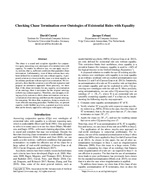Checking Chase Termination over Ontologies of Existential Rules with Equality
From International Center for Computational Logic
Checking Chase Termination over Ontologies of Existential Rules with Equality
David CarralDavid Carral, Jacopo UrbaniJacopo Urbani
David Carral, Jacopo Urbani
Checking Chase Termination over Ontologies of Existential Rules with Equality
Proceedings of the 34rd Conference on Artificial Intelligence (AAAI 2020), February 2020
Checking Chase Termination over Ontologies of Existential Rules with Equality
Proceedings of the 34rd Conference on Artificial Intelligence (AAAI 2020), February 2020
- KurzfassungAbstract
The chase is a sound and complete algorithm for conjunctive query answering over ontologies of existential rules with equality. To enable its effective use, we can apply acyclicity notions; that is, sufficient conditions that guarantee chase termination. Unfortunately, most of these notions have only been defined for existential rule sets without equality. A proposed solution to circumvent this issue is to treat equality as an ordinary predicate with an explicit axiomatisation. We empirically show that this solution is not efficient in practice and propose an alternative approach. More precisely, we show that, if the chase terminates for any equality axiomatisation of an ontology, then it terminates for the original ontology (which may contain equality). Therefore, one can apply existing acyclicity notions to check chase termination over an axiomatisation of an ontology and then use the original ontology for reasoning. We show that, in practice, doing so results in a more efficient reasoning procedure. Furthermore, we present equality model-faithful acyclicity, a general acyclicity notion that can be directly applied to ontologies with equality. - Projekt:Project: CPEC
- Forschungsgruppe:Research Group: Wissensbasierte SystemeKnowledge-Based Systems
@inproceedings{CU2020,
author = {David Carral and Jacopo Urbani},
title = {Checking Chase Termination over Ontologies of Existential Rules
with Equality},
booktitle = {Proceedings of the 34rd Conference on Artificial Intelligence
(AAAI 2020)},
year = {2020},
month = {February}
}
